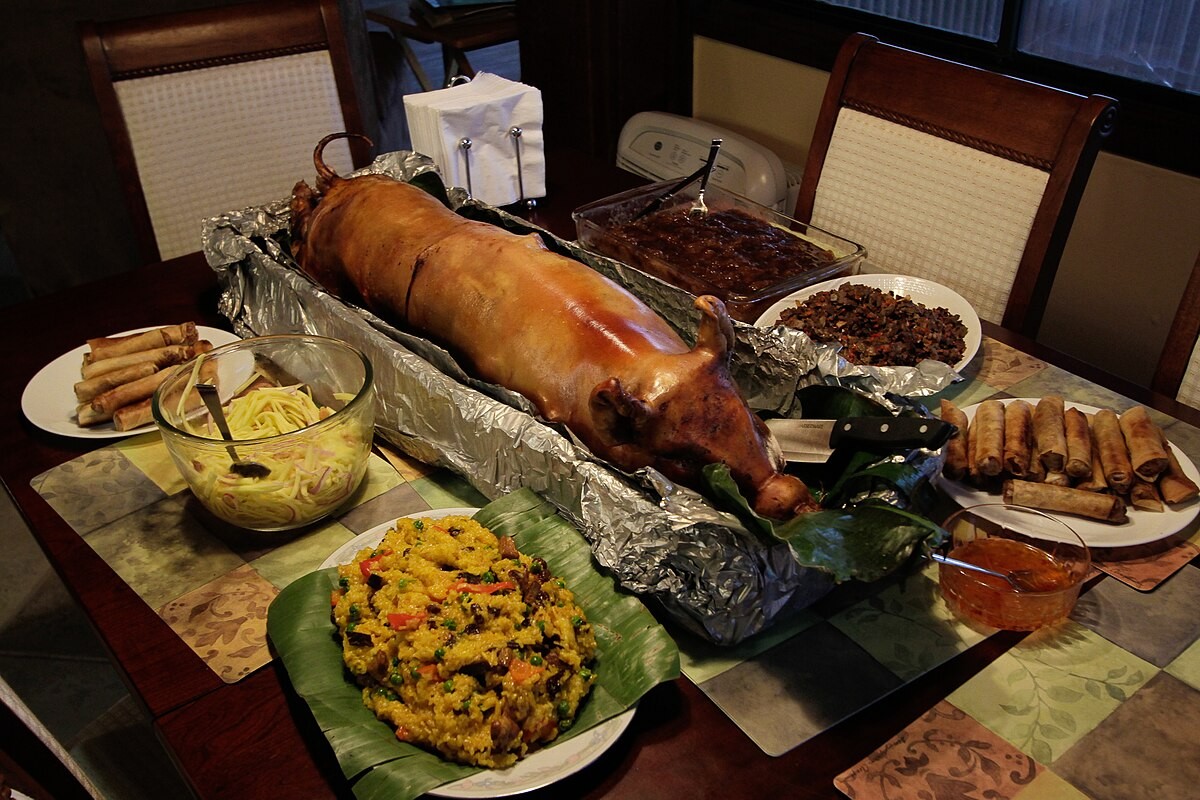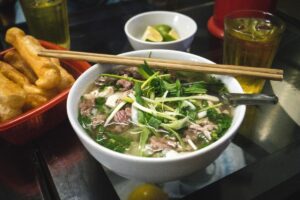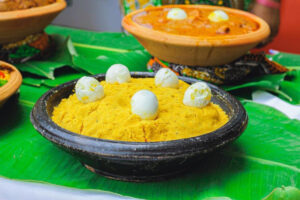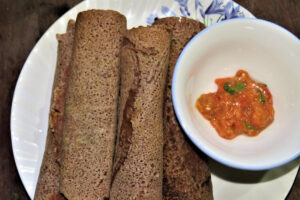Filipino cuisine is a tapestry of flavors woven with centuries of culinary tradition, diverse regional influences, and an abundance of fresh ingredients. From the iconic Adobo to the sizzling Sisig, Filipino food is bold, comforting, and utterly delicious. Get ready for a journey that will awaken your tastebuds and leave you craving more!
1. Adobo (Chicken or Pork): The Unofficial National Dish
Description:
Adobo is the quintessential Filipino dish, so much so that it’s often considered the unofficial national dish. Chicken or pork is braised in a fragrant marinade of soy sauce, vinegar, garlic, peppercorns, and bay leaves. The result is a savory, slightly tangy, and incredibly tender dish that embodies the essence of Filipino home cooking.
Recipe:
https://blue-kitchen.com/2021/01/20/chicken-adobo/
Key Ingredients:
Chicken or pork, soy sauce, vinegar, garlic, peppercorns, bay leaves.
Popular Restaurant:
Abe in Serendra, Taguig (known for its modern Filipino cuisine, including a delicious Adobo)
2. Sinigang: Soup for the Soul
Description:
Sinigang is a beloved Filipino soup known for its sour and savory broth. The souring agent can vary depending on the region, popular choices include guava, tamarind, calamansi, or kamias. Sinigang features a variety of proteins (fish, pork, beef, shrimp) and vegetables like kangkong (water spinach), radish, and long beans.
Recipe:
https://panlasangpinoy.com/pork-sinigang-na-baboy-recipe/
Key Ingredients:
Souring agent (tamarind, guava, etc.), protein, vegetables, onions, tomatoes, fish sauce.
Popular Restaurant:
Sentro 1771 in Greenbelt, Makati (offers a range of Filipino dishes, including several Sinigang variations)
3. Lechon: Celebration Feast
Description:
Lechon, a whole roasted pig, is the centerpiece of Filipino celebrations. The pig is marinated and stuffed with aromatics, then slow-roasted over charcoal until the skin becomes irresistibly crispy and the meat incredibly succulent. Lechon is often served with a liver-based dipping sauce called Lechon sauce.
Recipe:
http://www.foodwithmae.com/recipe-view/maes-slow-roasted-pork-lechon/
Key Ingredients:
Whole pig, spices and aromatics for stuffing (lemongrass, garlic, onions, etc.), Lechon sauce.
Popular Restaurant:
Zubuchon in Cebu (famous for its Cebu-style Lechon)
4. Kare-Kare: Peanut Butter Stew Delight
Description:
Kare-Kare is a rich and flavorful stew featuring oxtail or other tender cuts of meat, vegetables like eggplant, string beans, and bok choy, and a thick, savory peanut sauce. Ground toasted rice adds to the sauce’s unique texture. Kare-Kare is often served with shrimp paste (bagoong) on the side, adding a salty and pungent kick.
Recipe:
https://jeanelleats.com/kare-kare-recipe-filipino-oxtail-peanut-stew/
Key Ingredients:
Oxtail (or other meat), vegetables, peanuts, ground toasted rice, annatto powder (for color), shrimp paste (bagoong).
Popular Restaurant:
Besa’s Kare-Kare in Paranaque City (specializes in Kare-Kare and other home-style Filipino dishes)
5. Crispy Pata: A Flavor and Texture Extravaganza
Description:
Crispy Pata is a Filipino culinary indulgence. A whole pork leg is boiled until tender, then deep-fried until the skin becomes shatteringly crisp and the meat remains succulent. It’s often served with a soy-vinegar dipping sauce.
Recipe:
https://blog.thermoworks.com/crispy-pork-pata-recipe/
Key Ingredients:
Pork leg, soy sauce, vinegar, garlic, peppercorns, oil for deep-frying.
Popular Restaurant:
Max’s Restaurant, multiple locations (a Filipino restaurant chain famous for its Crispy Pata)
6. Sisig: Sizzling, Spicy, and Flavorful
Description:
Sisig originated in Pampanga and is now a beloved dish throughout the Philippines. Chopped parts of pig’s head (ears, cheeks, snout) are marinated, boiled, grilled, and then chopped and sizzled on a hot plate with onions, chili peppers, and often a touch of calamansi. Sisig variations can include other meats like chicken, seafood, or even tofu.
Recipe:
https://panlasangpinoy.com/sizzling-crispy-sisig/
Key Ingredients:
Pork (cheeks, ears, snout), onions, chili peppers, calamansi (optional), soy sauce, vinegar.
Popular Restaurant:
Aling Lucing’s in Angeles City, Pampanga (the birthplace of Sisig)
7. Tinola: A Comforting Chicken Soup
Description:
Tinola is a nourishing chicken soup with a delicate balance of flavors. Chicken is simmered in a broth flavored with ginger, onions, garlic, and fish sauce. Green papaya and chili pepper leaves (dahon ng sili) add a subtle sweetness and a mild peppery note.
Recipe:
https://panlasangpinoy.com/filipino-chicken-tinola-recipe/
Key Ingredients:
Chicken, ginger, onions, garlic, fish sauce, green papaya, chili pepper leaves (dahon ng sili)
Popular Restaurant:
Tinola is a common homestyle dish but can be found in restaurants specializing in Filipino cuisine.
8. Bicol Express: A Fiery Delicacy
Description:
Bicol Express is a spicy and creamy dish hailing from the Bicol region. Pork is simmered in a rich coconut milk gravy infused with long chilies, onions, garlic, and shrimp paste. The heat level can vary but is typically fiery, yet balanced by the sweetness of coconut milk.
Recipe:
https://www.kawalingpinoy.com/bicol-express/
Key Ingredients:
Pork, long green chilies, coconut milk, onions, garlic, shrimp paste (bagoong alamang)
Popular Restaurant:
Lorenzo’s Way in Bonifacio Global City, Taguig (features Bicolano specialties, including Bicol Express)
9. Pinakbet: Vegetables with Shrimp Paste Punch
Description:
Pinakbet is a vegetable stew originating from the Ilocos Region of the Philippines. It features various vegetables like eggplant, bitter melon (ampalaya), okra, string beans, and squash, cooked with tomatoes, onions, garlic, and a generous helping of shrimp paste (bagoong). The shrimp paste adds a salty, pungent, and umami-rich flavor to the dish.
Recipe:
https://www.food.com/recipe/pinakbet-filipino-meat-veggie-stew-with-shrimp-paste-351653
Key Ingredients:
Mixed vegetables (eggplant, bitter melon, squash, etc), onions, tomatoes, garlic, shrimp paste (bagoong), pork (optional).
Popular Restaurant:
Pinakbet is often enjoyed as a home-cooked meal but can be found in Filipino eateries.
10. Bulalo: Beef Shank and Bone Marrow Goodness
Description:
Bulalo is a hearty beef shank soup that brings warmth and comfort to the table. Beef shanks with bone marrow are simmered for hours until melt-in-your-mouth tender. The clear broth is flavored with onions, garlic, peppercorns, and often includes vegetables like cabbage, corn, and string beans.
Recipe:
https://panlasangpinoy.com/bulalo-stewed-beef-shank/
Key Ingredients:
Beef shanks with bone marrow, onions, garlic, peppercorns, vegetables (cabbage, corn, etc.).
Popular Restaurant:
R&J Bulalohan in Tagaytay (known for its delicious and affordable Bulalo)
Conclusion
This culinary adventure has been a mere glimpse into the vast and delicious landscape of Filipino cuisine. Remember, the best way to experience the authentic flavors of the Philippines is with an open heart and a sense of adventure!
Let me know if you’d like to delve deeper into any particular dish or discover new and exciting areas of Filipino cuisine!




